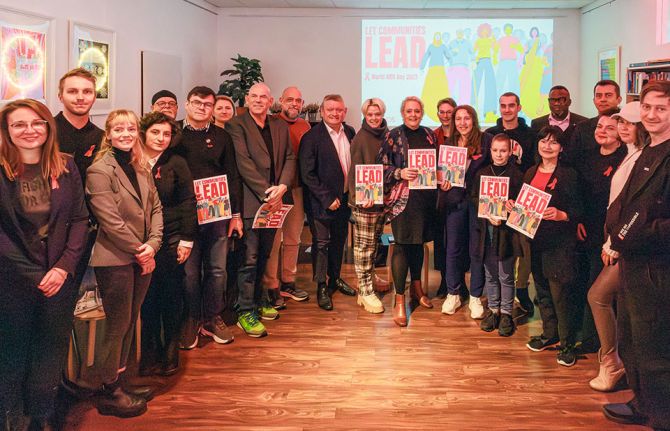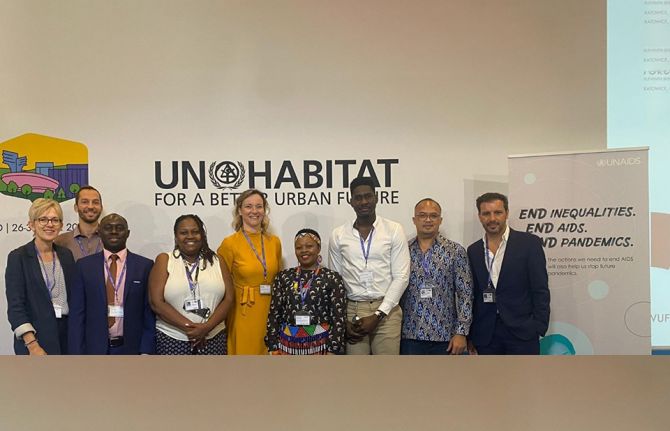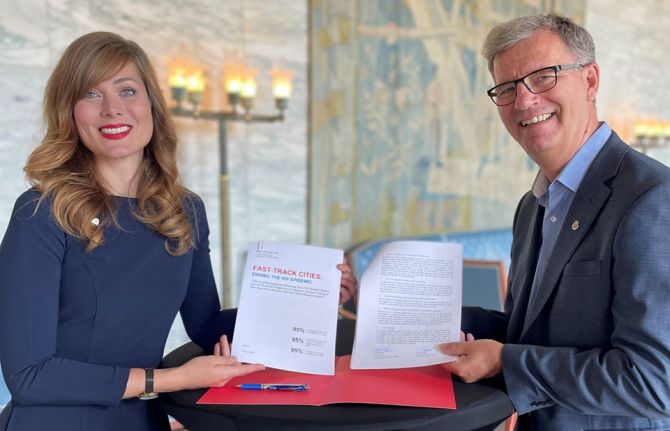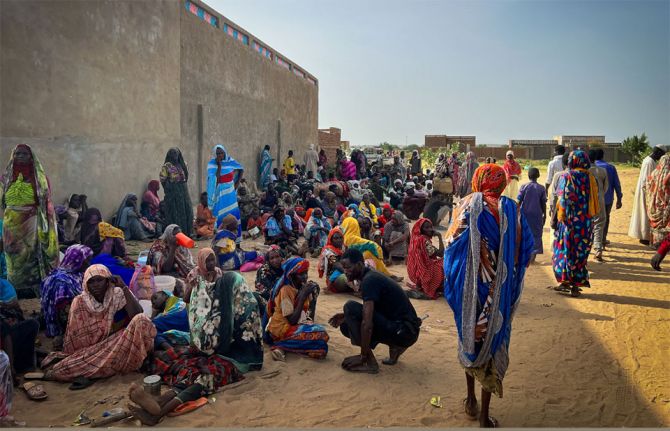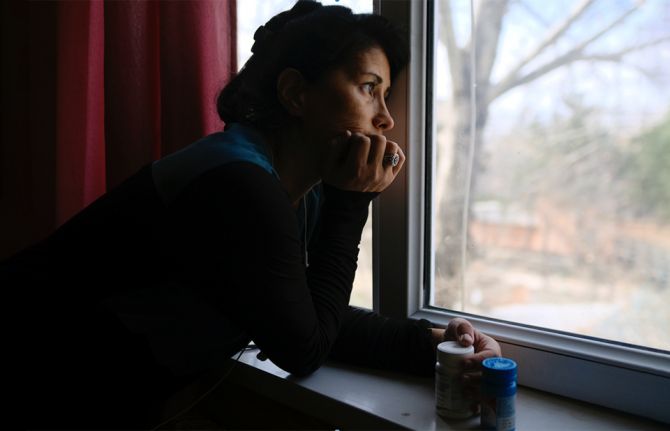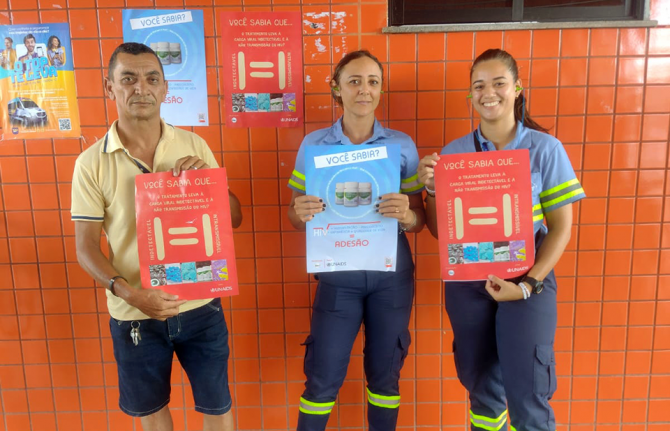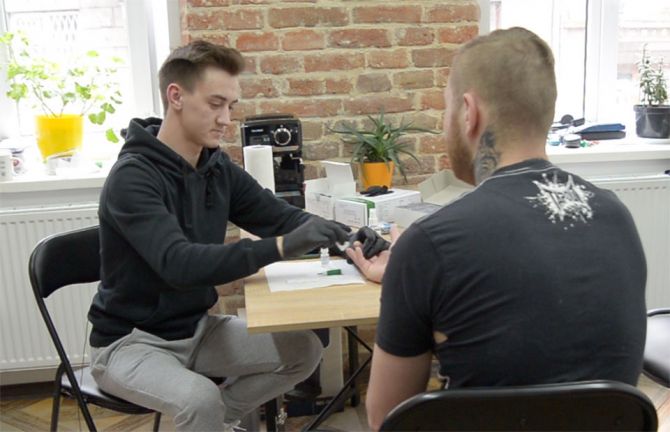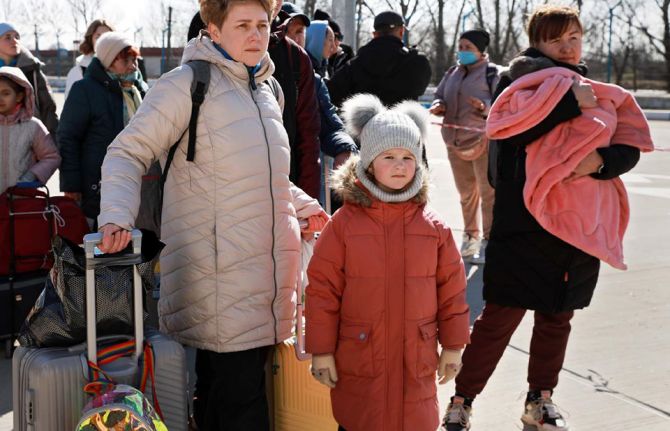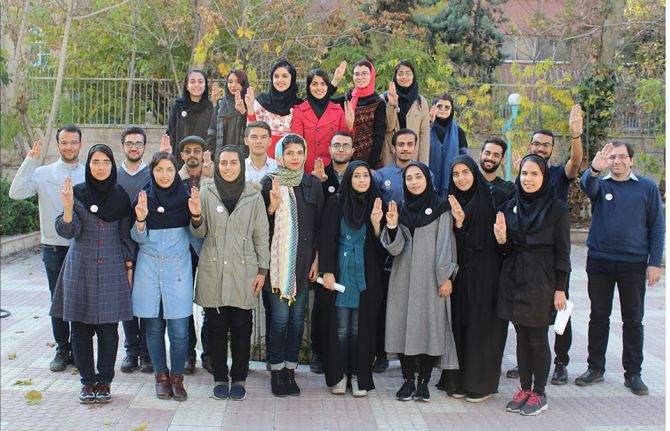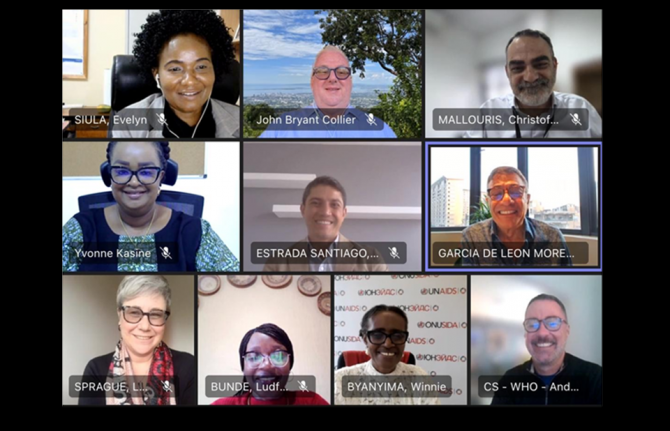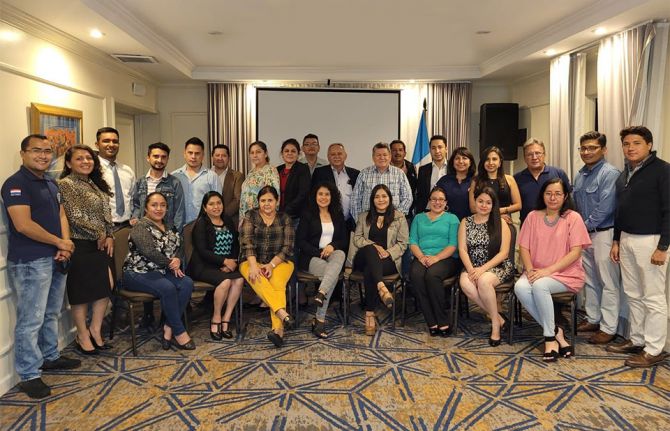
Feature Story
Young people convene in Mali to revolutionize the AIDS response
15 April 2011
15 April 2011 15 April 2011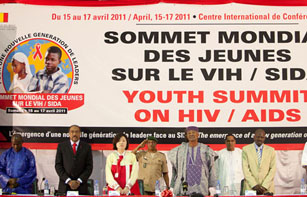
UNAIDS Executive Director Michel Sidibé (second from the left) and President of the Republic of Mali, Amadou Toumani Touré (fourth from left) at the opening of the Youth Summit in Bamako, Mali. 15 April 2011.
Credit: Kris Krug
Thirty years into the response to HIV, an estimated 3000 young people are newly infected with HIV everyday. Many young people living with HIV still do not have access to treatment and only 34% of all young people have correct and comprehensive knowledge about HIV and how to protect themselves.
That is why more than 150 young HIV activists from across the world have gathered for a three day summit in Bamako, Mali, to rally a youth-led response on HIV in lead up to the United Nations General Assembly High Level Meeting on AIDS taking place in New York from 8 to 10 June 2011.
Convened under the patronage of the President of the Republic of Mali, Amadou Toumani Touré, and co-hosted by UNAIDS, the summit provides a forum for young people to explore and commit to innovative ways to mobilize young people in the AIDS response.
“I am ready to take the call to action coming out of the Mali Youth Summit on HIV to the High Level Meeting at the UN. Young people must take the leadership of the AIDS response, and they must be given the space to lead,” said President Touré.
You are the most powerful engine we have for transformation and progress. Do not let anyone tell you that you are the leaders of tomorrow. You are the leaders of today
UNAIDS Executive Director Michel Sidibé
Speaking at the opening of the summit, UNAIDS Executive Director Michel Sidibé urged young leaders to claim their space in the AIDS movement: “You are the most powerful engine we have for transformation and progress. Do not let anyone tell you that you are the leaders of tomorrow. You are the leaders of today.”
A Call for Action to articulate the vision of the youth movement is being developed by the delegates. It will be launched online at the closing of the summit, marking the start of an intensive period of online and offline social mobilization to get endorsement of the declaration by young people all around the world.

Participants at the Youth Summit on HIV.
Bamako, Mali. 15 April 2011. Credit: AFP
"We now feel that it is time for us to reclaim our future using every energy and power. We call on world leaders to respond to the Call for Action that will come out of this summit, but we also call on young people everywhere to mobilize for the AIDS response," Marie Tamoifi Nkom, steering committee member of the Mali Youth Summit on HIV from Cameroon.
While youth organizations and networks focusing on HIV are increasingly mobilized in the response, young people continue to face difficulties in accessing and influencing decision-makers and are not equal partners. Therefore, the Summit will also serve to link and strengthen existing youth networks across different regions and deepen their connections with the AIDS community.
Young people are still at risk of HIV, with about 40% of all new HIV infections among adults occurring among young people aged 15-24. Young women are particularly vulnerable, accounting for 64% of new infections among young people worldwide.

Feature Story
Israel signs first Agreement of Cooperation with UNAIDS
13 April 2011
13 April 2011 13 April 2011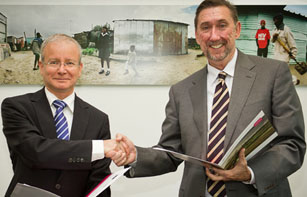
(From left) Ambassador Aharon Leshno-Yaar, Permanent Representative of Israel to the United Nations in Geneva; Dr Paul De Lay, UNAIDS Deputy Executive Director, Programme. Geneva, 13 April 2011.
Credit: UNAIDS
Israel signed its first-ever multi-year cooperation agreement with the Joint United Nations Programme on HIV/AIDS (UNAIDS) on 13 April 2011.
Ambassador Aharon Leshno-Yaar, Permanent Representative of Israel to the United Nations in Geneva, signed the agreement on behalf of Israel’s Agency for International Development Cooperation (MASHAV). Dr Paul De Lay, UNAIDS Deputy Executive Director, Programme, signed the agreement on behalf of UNAIDS.
The signing, which took place at UNAIDS headquarters in Geneva, was attended by Professor Alex Leventhal on behalf of the Israeli Ministry of Health and by Ron Adam, Deputy Permanent Representative of the Mission of Israel to the United Nations in Geneva
Prior to this agreement, in cooperation with UNAIDS, MASHAV, Israel’s international development cooperation agency, organized training courses on aspects of the HIV response for public health and welfare representatives from developing countries in Africa and Central Asia. This agreement of cooperation with UNAIDS will enhance Israel’s relationship with the organization.
Also on Wednesday, Israel signed an Agreement of Cooperation with the World Health Organization.

Feature Story
Middle East and North Africa ready to scale up harm reduction services in its response to AIDS
13 April 2011
13 April 2011 13 April 2011
A man receiving opioid substitution therapy as part of a harm reduction programme in the Islamic Republic of Iran. Credit: UNAIDS/P.Virot
Injecting drug use and the growing HIV epidemic in the Middle East and North Africa were the focus of the Harm Reduction 2011 conference that took place in Beirut, Lebanon from 3-7 April 2011
Some 1000 scientists, researchers, drug users, doctors and politicians from 80 countries participated in the first international drugs-related conference to be held in the Middle East and North African (MENA) region.
Discussions during the conference centred around the existence of legislation in the region that hinders the implementation of harm reduction programmes. Nearly one million people in the Middle East and North Africa (MENA) inject drugs. Injecting drug use is already the major mode of HIV transmission in Afghanistan, Pakistan, the Islamic Republic of Iran (more than 67% of registered cases) and Libya (up to 90% of cases). It is also significant in Oman and Bahrain and has growing incidence in Morocco and Egypt.
The region is slowly increasing availability of harm reduction programmes although countries are at different stages of introducing the different components of the harm reduction package. The Islamic Republic of Iran is a model—with a rapidly scaled-up plan to make available needles and syringes, opioid substitution therapy (OST), HIV testing and counseling, and sexually transmitted infection services. Morocco also has integrated harm reduction policies into its national AIDS strategic plan. Pilot drop-in centres with needle and syringe exchange are in place, and preparations for introducing OST are underway.
The government’s support for harm reduction measures such as the provision of Buprenorphine is based on our belief that the evidence for such a public health measure is irrefutable
Dr Walid Ammar, Director General of the Lebanese Ministry of Public Health.
The Lebanese Minister of Health announced during the conference the launch of a pilot programme consisting of the first ever legal sale of Buprenorphine in government hospitals for people who inject drugs. “The government’s support for harm reduction measures such as the provision of Buprenorphine is based on our belief that the evidence for such a public health measure is irrefutable—its implementation has helped to contain HIV and Hepatitis infections amongst injecting drug use communities in every country it has been introduced,” said Dr Walid Ammar, Director General of the Lebanese Ministry of Public Health.
Despite positive changes occurring in some countries, repressive measures and criminalization of drug users are still predominant in the region. This discourages people at higher risk of transmission from accessing HIV services.
Funding harm reduction
The uptake of harm reduction in most of the region has been slow mainly due to governments and civil society organizations lack of awareness as well as capacity to implement effective harm reduction activities.
To try reverse this situation, the Global Fund to fight AIDS, Tuberculosis and Malaria has granted $US 8.3 million to a multi-country project. Its aim is to raise awareness, advocate and build capacity of civil society organizations to scale up the provision of harm reduction services in 12 countries over the next three years. The 12 countries included in the project are Iran, Pakistan, Libya, Lebanon, Syria, Jordan, Bahrain, Morocco, Egypt, Afghanistan, Oman and West Bank and Gaza.
The project will begin in July 2011 and will be coordinated by the Middle East and North Africa Harm Reduction Association (MENAHRA), based in Beirut.
External links

Feature Story
UNAIDS Reference Group on HIV and Human Rights encourages UN Member States to focus on human rights ahead of High Level Meeting on AIDS
12 April 2011
12 April 2011 12 April 2011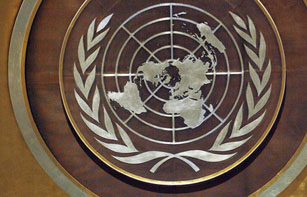
The UNAIDS Reference Group on HIV and Human Rights has issued a statement encouraging UN Member States to reaffirm the focus on human rights that has driven 30 years of progress in the global HIV response. The statement outlines five key priorities for Member States as they negotiate the outcome document for the High Level Meeting on AIDS between now and June 2011.
“Commitment to human rights is a cornerstone of the success we have seen. It unites us, drives results, and is critical for our future progress,” said Jonathan Cohen, Co-Chair of the Reference Group and Director of the Law and Health Initiative of the Open Society Foundations.
The statement issued by the Reference Group asks governments to reaffirm the emphasis on a human rights based approach that obliges nations “to fulfill the human right to health and that respects, protects and fulfils the human rights of people living with, affected by and vulnerable to HIV.”
It also underlines that a central challenge of the next five years will be to make HIV treatment available to all who need it but are not receiving it. Among other steps, the Group notes that this will require maximum use of flexibilities under the TRIPS agreement to ensure the competition needed to lower the price of second-line and third-line treatments and their production in generic form.
Commitment to human rights is a cornerstone of the success we have seen. It unites us, drives results, and is critical for our future progress
Jonathan Cohen, Director of the Law and Health Initiative of the Open Society Foundations.
The statement also asks Member States to reaffirm their commitment to the removal of laws, policies, practices, stigma and discrimination that block effective responses to AIDS. This includes several types of laws, policies and practices such as those that criminalize people living with HIV; those that permit violence and discrimination against women; or those that impede access to HIV services, including treatment, prevention and palliative care.
Michaela Clayton, Reference Group Co-Chair and Director of the AIDS and Rights Alliance for Southern Africa noted that the apparent flat-lining of financial resources for HIV is of significant concern and threatens the gains that have been made. “The crisis we are seeing today is not an economic crisis, but a crisis of priorities. What we need is solidarity for the right priorities and to push a standard of commitment that should be expanded and replicated for other health, development and human rights imperatives.”
The international community must renew its commitment to place people living with HIV at the centre of the AIDS response, states the group. According to the statement, people living with HIV must be empowered to live successfully with HIV, maintain their health, dignity and security and prevent the onward transmission of HIV. People living with HIV must participate meaningfully in all aspects of the response to HIV.
The UNAIDS Reference Group on HIV and Human Rights was established in 2002 to advise UNAIDS on all matters relating to HIV and human rights. The Group speaks with an independent voice and its views and recommendations do not necessarily reflect the positions of the UNAIDS Secretariat or its Cosponsors.
Publications
Related

Feature Story
Dairy cooperative in Tanzania is helping rural women to help themselves
11 April 2011
11 April 2011 11 April 2011A version of this story is also published at ILO.org
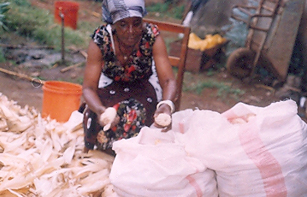
Faith carries and bags maize from her farm before storage. Credit: ILO/AIDS
“I learnt that you need money or a business to generate enough income to be able to travel to town for regular check-ups and to collect antiretroviral drugs. We do not have these services at our village dispensary.”
These are the words of Faith who is 61 years old and one of the estimated 730 000 women living with HIV in Tanzania, where national prevalence is around 5.6%. In her village in the northern Kilimanjaro region, she is a member of a women’s dairy cooperative which also provides financial services such as savings and credit through the village community bank.
With support from an International Labour Organization (ILO) programme funded by the Swedish International Development Cooperation Agency, the cooperative organizes entrepreneurial skills-building and HIV awareness-raising activities. This is a seen as a real source of empowerment for rural women like Faith, who live far from the towns where most HIV services are located.
Faith keeps three healthy dairy cows with good yields. She makes up to US$ 250 a month from the milk she sells through the women’s dairy cooperative. “It is a lot of money for me,” she says. “The cooperative trained me and provided a market for my cow’s milk.”
She is one of the 1600 women and men who participated in the ILO/Sida Start and Improve Your Business training programme in Tanzania in 2009. The programme has a specific focus on cooperatives as structures that can help reach workers in the informal economy with the aim of preventing HIV, mitigating its impact and improving conditions for workers living with, and affected by, the virus.
I get all the nutritious food recommended by doctors from my own farm. I use part of the money to pay for school fees for my two nieces
Faith, aged 61, from a village in the northern Kilimanjaro region of Tanzania
When she tested HIV-positive in 2005, Faith decided to accept her status and be open about it, despite the high level of stigma and discrimination in her community. After initial difficulties, Faith says she has found acceptance and has become a peer educator, supporting other HIV-positive people who want to start their own businesses.
She has now been able to diversify her sources of income and grows maize and other vegetables. “I get all the nutritious food recommended by doctors from my own farm. I use part of the money to pay for school fees for my two nieces.”
According to Faith, her acceptance of her HIV status has given her a long life. Her self-confidence, sense of dignity and economic independence have grown immeasurably with the opportunities created by the cooperative.
Dr Luc Barriere-Constantin, the UNAIDS Country Coordinator for Tanzania, agrees that cooperatives can play a key role in boosting prospects for HIV-positive people. “It is essential to re-build the capacities of people living with HIV through the restoration of self-confidence and hope. To do that we don’t necessarily need millions of dollars, but simply to be convinced, and to convince those living with the virus, that they can make a valuable contribution. This project shows it is possible.”
External links
External links
Publications
Related

Feature Story
Challenges, achievements and aspirations to be shared as civil society gears up for General Assembly High Level Meeting on AIDS
08 April 2011
08 April 2011 08 April 2011
The United Nations General Assembly hall will host a new format of interactive dialogue between civil society organizations and United Nations member states on how better to respond to HIV on 8 April 2011.
The debates are taking place as part of the informal Civil Society Hearing being held at the UN in New York which is presided over by the President of the 65th session of the United Nations General Assembly Mr Joseph Deiss. The event provides a platform for UN member states to engage with civil society representatives and hear their views on how to further the AIDS response. This will in turn inform discussions at the High Level Meeting on AIDS which is being held in United Nations General Assembly, New York, from 8-10 June 2011.
A broad consortium of participants from civil society organizations from across the world are assembling at the UN to engage in the exchange. The participants represent a cross section of the civil society response to the epidemic, including people living with HIV and people representing population groups most affected by the epidemic.
This is a unique opportunity for member states to learn from the people who are living the epidemic and provoking real change
Kate Thomson, Head of Civil Society Partnerships at UNAIDS.
“This is a unique opportunity for member states to learn from the people who are living the epidemic and provoking real change,” said Kate Thomson, Head of Civil Society Partnerships at UNAIDS. “We hope that in the lead up to the High Level Meeting on HIV these debates will put more emphasis and attention on the main issues of concern to civil society and that these issues will be reflected in the final declaration.”
After the official opening by Mr Deiss, the UN Secretary-General Ban Ki-moon, Michel Sidibé, the Executive Director of UNAIDS and a representative from the Association Nationale de Soutien aux Séropositifs et aux Malades du SIDA, three panels will be held in the form of moderated discussions. Debate is expected to take place on the following three themes:
- Enhancing community-level access: Opportunities for healing social and systemic ills;
- A new generation of national partnerships: Diversity in dialogue; and
- Synergies among global movements: Opportunities for shared action.
The three panels will comprise of panellists representing civil society, member states and an eminent person. Each will be overseen by a moderator who will call on other participants to intervene from the floor. This is the first time this format has been used in the General Assembly Hall.
The outcome of the discussions will form part of the preparatory process for the High Level Meeting on AIDS in June. The General Assembly President will prepare a summary report from the event which will be issued as an official General Assembly document prior to the High Level Meeting and serve as a reference for member states during negotiations around a new declaration on HIV.
The debates will be broadcast live on www.un.org/webcast
See below for the full agenda (all times are EST):
Informal Interactive Hearing with Civil Society for the High Level on HIV Friday 8 April 2011
10.00-10.30
- Opening Session chaired by the President of the General Assembly
- Opening remarks by the President of the General Assembly, the UN Secretary General, The Executive Director of UNAIDS and Ms Jeanne Gapiya of Association Nationale de Soutien aux Séropositifs et aux Malades du SIDA
10.30-11.45
- Panel One: Enhancing Community Level Access: Opportunities for Healing Social Ills
11.45-13.00
- Panel Two: A New Generation of Partnerships: Diversity in Dialogue
13.30-14.15
- Press conference
15.00-16.45
- Panel Three: Synergies among Global Movements: Opportunities for Shared Action
16.45-17.00
- Closing Session
- Chaired by the President of the General Assembly
- Closing remarks by the President of the General Assembly, UNAIDS Executive Director and the Programme Coordinator of the Friends of Life Organisation.
Related links

Feature Story
Asia-Pacific region committed to achieving universal access to HIV prevention, treatment, care and support
08 April 2011
08 April 2011 08 April 2011
Steve Kraus, Director, UNAIDS Regional Support Team for Aisa and the Pacific, gives an overview on the epidemic and response in the region. Credit: UNAIDS / V. Dithajohn
Nearly 30 countries from Asia and the Pacific have unanimously committed to driving forward the region’s efforts to reach universal access to HIV services by 2015.
This commitment came as more than 250 representatives from government, civil society, people living with HIV, UN agencies and development partners from across the region met in Bangkok, Thailand from 30-31 March, to review progress made and to develop key actions to achieve universal access to HIV prevention, treatment, care an support.
Through a Resolution, unanimously adopted at the end of the review, participants underlined the need for an HIV prevention revolution focusing on key populations at higher risk. Also, the need to sustain gains made in the provision of HIV treatment and to take urgent action to address legal barriers, stigma and discrimination and funding gaps that block progress in the region’s response to AIDS. The Resolution will now be presented to the 67th Commission of the UN Economic and Social Commission in Asia and the Pacific where it will be considered for official adoption by the entire Commission comprising 62 Member governments.
“This is a region showing it is serious about an effective Asia Pacific response to AIDS, and is willing to stand up for sex workers, people who use drugs, men who have sex with men, transgender persons and policies that uphold the human rights of people living with HIV,” said Mr Steve Kraus, Director of the UNAIDS Regional Support Team for Asia and the Pacific. “Commitment and energy have produced a strong and clear agreement on how to achieve universal access in Asia Pacific, giving a strong regional voice in the lead up to the UN High Level Meeting in New York in June,” he added.
This is a region showing it is serious about an effective Asia Pacific response to AIDS, and is willing to stand up for sex workers, people who use drugs, men who have sex with men, transgender persons and policies that uphold the human rights of people living with HIV
Steve Kraus, Director, UNAIDS Regional Support Team for Asia and the Pacific.
Over the two-day meeting, hosted by UNAIDS in collaboration with the UN Economic and Social Commission in Asia and the Pacific, participants noted important progress in the region to date, including that HIV epidemics have significantly slowed or stabilized across the region and that a number of the countries are reaching high levels of coverage for antiretroviral treatment.
However, critical challenges were raised as no country in the region is reaching universal access to HIV prevention, treatment, care and support. One in three people in the region do not have access to HIV treatment; 60% of people living with HIV in the region do not know their HIV status; and key affected communities continue to be subjected to stigma and discrimination, punitive laws, policies and practices which obstruct access to HIV services. Many countries in the region—including those with or approaching middle-income status—rely heavily on international funding for their AIDS responses.
Speaking at the opening, Dr Siriwat Tiptaradol, Deputy Permanent Secretary from the Ministry of Health in Thailand urged countries to make health is a policy priority and to ensure a partnership response: “Progress on universal access can only be possible when different arms of the same government, together with civil society, join together with common goals.We must find ways to support each other, particularly at the regional level, to make AIDS funding a collective responsibility.”

Igor Mocorro, a member of ‘Youth Lead’, addresses the plenary at the Asia Pacific Regional Consultation on Universal Access. Credit: UNAIDS / V. Dithajohn
In times of fiscal austerity and competing development priorities, the need to sustain momentum on HIV was echoed throughout the Consultation. “The world’s most populous region cannot afford complacency on AIDS. Political leadership with civil society and the key affected communities as the cornerstone of the response requires fresh perspectives from the ground,” said ESCAP Social Development Division Director, Nanda Krairiksh.
Strongly emphasized was the critical importance of continued engagement and motivation of the region’s youth—particularly those from key populations at higher risk. Young leaders underlined the importance of the full involvement of young people in the HIV response and urged national leaders and partners to ensure their voices are equally heard and heeded.
“We have the passion for change and it’s time for leaders to take young people seriously as equal partners and key actors in society,” said Igor Mocorro, a member of ‘Youth Lead’, a programme to develop youth AIDS leaders from key affected populations. “We know the realities; we can make a difference.”
Multimedia
Multimedia

Feature Story
Empowering young people in Latin America to participate in Global Fund proposals through national mechanisms
07 April 2011
07 April 2011 07 April 2011
Participants in the workshop learn how to engage youth in the development, implementation and monitoring of Global Fund proposals. Panama City, Panama. 2-4 April 2011
Young people working on AIDS issues in Latin America are learning how to engage youth in the development, implementation and monitoring of Global Fund proposals through national mechanisms.
“We want to be able to speak on our own behalf. This workshop will give us tools to advocate at country level to ensure the creation of youth-centred programmes that reflect our needs,” said Ivens Reyner from the Youth Coalition—an international organization of young people committed to promoting adolescent and youth sexual and reproductive rights—and one of the young people responsible for organizing a training.
The event, which took place in Panama City from 2-4 April, is part of a series of regional workshops organized by the Youth Coalition and the Secretariat of the Global Fund to fight AIDS, Tuberculosis and Malaria.
The Global Fund Board of Governors recognized in its meeting in late 2009, the need to include more young men and women in the various processes both at global and national level. In recent months youth representatives from the Africa and Asian Pacific regions have been attending similar workshops in Cape Town and Bangkok respectively.
This workshop will give us tools to advocate at country level to ensure the creation of youth centred programmes that reflect our needs
Ivens Reyner, Youth Coalition member and organizer of the training
The young people who participated in the South Africa and Thailand workshops subsequently joined the Country Coordinating Mechanisms in their countries. They also participated in the proposal development and even become sub-recipients of the Global Fund grants.
“Young people taking ownership and demanding involvement in national programmes and Global Fund processes is core to ensure we reach universal access to HIV prevention, treatment, care and support in Latin America,” said UNAIDS Regional Director, Dr Cesar Nuñez.
Over three days, participants learned about how the Global Fund works. From the perspective of their fictional country “Youthland”, and using interactive methods and role play, young participants simulated all the processes involved in grant implementation from proposal development to disbursement of funds. They also developed advocacy and communication plans to be able to engage with their national partners.
“UNFPA is supporting this joint initiative between the Youth Coalition and the Global Fund because it is strategic to ensure that youth and their sexual and reproductive rights and health are adequately incorporated in the Global Fund programmes,” said Cecilia Maurente, Youth Regional Focal Point on behalf of Ms Marcela Suazo, Regional Director of UNFPA for Latin America and the Caribbean.
There are an estimated 1.8 billion adolescents and youth in the world today aged 10 to 24 years, accounting for more than a quarter of the world's population. Some 18% of the total population in Latin America is young people.
“Now we have 20 knowledgeable young people going back to their countries ready to engage with their Country Coordinating Mechanisms and national programmes to take the lead in developing new HIV prevention efforts for youth,” said Ricardo Baruch from the Youth Coalition and organizer of the training. “With young people on board we can make it, we can reach zero new infections in Latin America.”
External links
Related

Feature Story
World Health Day 2011: Urgent action necessary to slow down the spread of drug resistance
07 April 2011
07 April 2011 07 April 2011A version of this story also appears at who.int
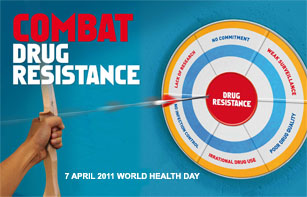
Credit: WHO
Drug resistance is becoming more severe and many infections are no longer easily cured, leading to prolonged and expensive treatment and greater risk of death, warns the World Health Organization (WHO) on World Health Day, 7 April 2011.
Under the theme "combat drug resistance", WHO calls for urgent and concerted action by governments, health professionals, industry, civil society and patients to slow down the spread of drug resistance, limiting its impact today and preserving medical advances for future generations.
Drug resistance is a natural process in which microorganisms acquire resistance to the drugs meant to kill them. With each new generation, the microorganism carrying the resistant gene becomes ever more dominant until the drug is completely ineffective. Inappropriate use of infection-fighting drugs (underuse, overuse or misuse) causes resistance to emerge more quickly.
On the brink of losing miracle cures
The trends are clear and ominous. No action today means no cure tomorrow
WHO Director-General Dr Margaret Chan
“The message on this World Health Day is loud and clear. The world is on the brink of losing these miracle cures,” said WHO Director-General Dr Margaret Chan. She added, “The trends are clear and ominous. No action today means no cure tomorrow.”
Measures to combat drug resistance
WHO has published a policy package that sets out the measures governments and their national partners need to combat drug resistance. These include:
- Develop and implement a comprehensive, financed national plan
- Strengthen surveillance and laboratory capacity
- Ensure uninterrupted access to essential medicines of assured quality
- Regulate and promote rational use of medicines
- Enhance infection prevention and control
- Foster innovation and research and development for new tools.
Resistance detected in a number of diseases
According to latest WHO figures, at least 440 000 of new cases of multidrug resistant-tuberculosis (MDR-TB) emerge each year, and by the end of 2010, 69 countries had reported extensively drug-resistant tuberculosis (XDR-TB). Resistance is also emerging to the antiretroviral drugs used to treat people living with HIV.
Getting everyone on the right track
Dr Mario Raviglione, Director of WHO Stop TB Department, who has been leading the preparations for World Health Day 2011, called for measures against drug resistance to be strengthened and implemented urgently. He added, “New collaborations, led by governments working alongside civil society and health professionals, if accountable, can halt the public health threat of drug resistance."
External links
External links
Related

Feature Story
Business sector can play key role in the AIDS response in Africa
06 April 2011
06 April 2011 06 April 2011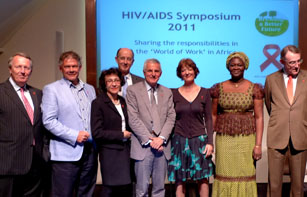
Speakers at the Heineken HIV/AIDS Symposium 2011
Thirty years into the epidemic, is business a full partner in the AIDS response in Africa? A recent symposium hosted by Heineken N.V. in Amsterdam highlighted that there are many ways the private sector can contribute.
With Sharing responsibilities in the ‘World of Work’ in Africa as its theme, the symposium took stock of current business practices in Africa—in the workplace and beyond—and explored ways around how business good practices can be scaled up. Access to HIV treatment, resistance to treatment and gaps in funding were three of the main key issues discussed.
“There are many reasons why HIV is a smart investment for businesses,” said Dr Hedia Belhadj, UNAIDS Director Partnerships: “Addressing HIV in the workplace creates trust among staff and helps sustain productivity. Addressing HIV more broadly helps to boost consumer markets and bring about economic growth and reduce poverty.”
The symposium brought together representatives from the government of The Netherlands, including AIDS Ambassador Dr Marijke Wijnroks, international and non-governmental organizations, the public health community and the private sector.
Addressing HIV in the workplace creates trust among staff and helps sustain productivity. Addressing HIV more broadly helps to boost consumer markets and bring about economic growth and reduce poverty
Dr Hedia Belhadj, UNAIDS Director of Partnerships
Mr Ben Knapen, the Netherlands Minister for European Affairs and International Co-operation stressed the importance of partnering with the private sector to respond to HIV. “My government believes that public-private partnerships are an important tool in the response to HIV. Bringing together partners from both the public and private sectors creates the synergy and leverage we need in order to step up our efforts,” said Mr Knapen.
Private sector’s knowledge, resources, capacity and contacts are valuable resources that can contribute to an effective response to AIDS. By using their corporate communications and marketing skills, businesses can help raise AIDS awareness and promote behavioral change among employees, their families and communities. Companies can incorporate prevention messages that promote gender equality in existing communication platforms as well as instating zero tolerance policies to eliminate stigma and discrimination.
Private sector to become full partner in the global response
Two out of three people living with HIV go to work each day, according to UNAIDS. So the workplace has a vital role to play in mitigating the impact of the AIDS epidemic and facilitating access to HIV prevention, treatment, care and support. Workers that are living with HIV and taking effective treatment can lead healthy, productive lives for many years. Heineken—which employs more than 70 000 people worldwide—realized the value of this.
In the early 1980’s, the company began building clinics and training staff to provide health care to employees. In 2001 it adopted and implemented its HIV workplace policy which contributed to improve the response to HIV among employees and their families.
Today, the brewing group's workplace programmes include a “know your status” campaign with voluntary counselling and testing events and training by peer health educators, who also raise awareness about HIV to pupils in local schools.
AIDS committees have been established in nine breweries to also oversee education and condom distribution campaigns, information sessions for people living with HIV and awareness events around World AIDS Day.
Heineken provides treatment for all employees living with HIV and further, it guarantees treatment for employees and their families for life, regardless of whether they are still employed at the company.
Not all companies are willing to or capable of making such a commitment. The question of sustainability and the long term commitment that the company has to shoulder, given the little likelihood for national services to replicate the quality of HIV service delivery, was seen by participants as a major obstacle in implementing workplace policies related to HIV.
Dr Belhadj outlined the importance of the new ILO Standard on HIV/AIDS and the world of work. It provides a platform for business to promote healthy workplaces by defining roles and responsibilities at all levels of policy and decision-making processes, implementation, and evaluation of HIV programmes in the workplace.
Participants agreed that, to become full partners in the AIDS response, businesses need to engage in high level advocacy. The private sector can use their weight to promote accountability and transparency by reporting on money spent on social welfare programmes. They can break the upward trajectory of costs of drugs, supplies and delivery and participate in innovative public-private partnerships on research and development.




